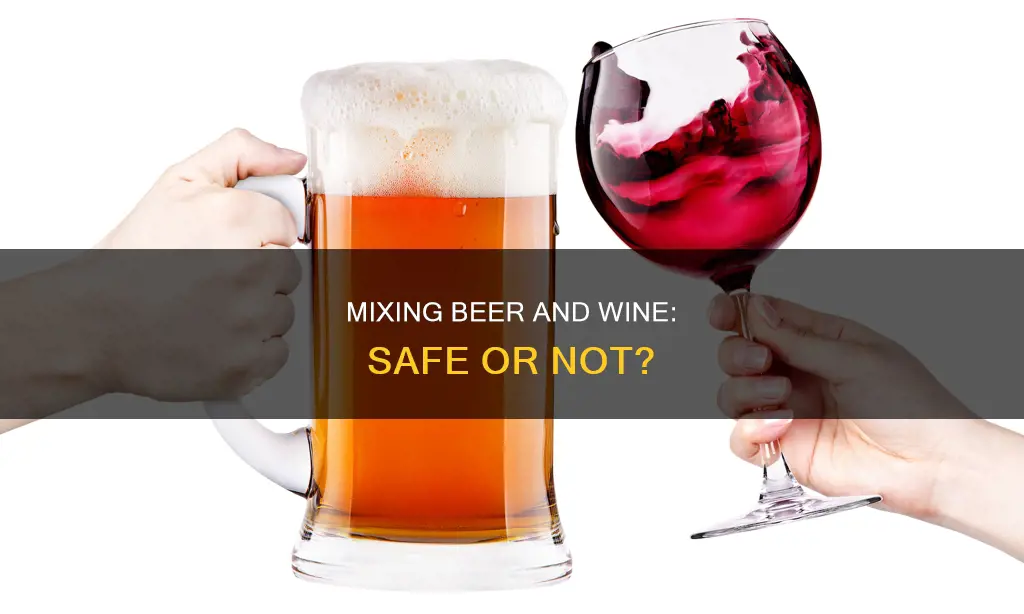
There are many old sayings about the order in which alcoholic drinks should be consumed, including beer before wine and you'll feel fine; wine before beer and you'll feel queer, beer before liquor, never been sicker; liquor before beer, you're in the clear, and the French saying Bière sur vin est venin, vin sur bière est belle manière (beer on wine is poison, wine on beer is fine). But do these sayings have any truth to them? In 2019, researchers at Cambridge University and Witten/Herdecke University in Germany set out to answer this question once and for all.
| Characteristics | Values |
|---|---|
| Is it a good idea to drink beer after wine? | No, it is not recommended to drink beer after wine. |
| Why? | Drinking beer after wine may worsen hangovers, make it harder to keep track of the number of drinks, and cause an upset stomach. |
| Hangover intensity | Research suggests that the order of drinks does not affect hangover intensity. |
| Dehydration | Beer and wine are both dehydrating drinks, and drinking them in any order can lead to dehydration and a hangover. |
| Carbonation | Beer contains a lot of CO2, which can cause alcohol to "hit the head" faster, but this may not be the main factor influencing hangovers. |
| Alcohol by volume (ABV) | Wine typically has a higher ABV than beer, so drinking wine first may lead to faster intoxication. |
| Congeners | Dark spirits and drinks with more congeners (natural compounds) may result in more severe hangovers. |
| Vomiting | Vomiting during or after drinking is associated with a higher likelihood of experiencing a hangover. |
| Perceived drunkenness | Participants who scored higher on a scale of drunkenness also reported more severe hangovers. |
What You'll Learn

Beer before wine, you'll feel fine
The saying goes: "Beer before wine and you'll feel fine; wine before beer and you'll feel queer." But does drinking beer after wine really make you feel sick?
In 2019, researchers at the Witten/Herdecke University in Germany and the University of Cambridge in the UK set out to answer this question once and for all. They recruited 90 participants aged 19 to 40 and split them into three groups. The first group drank about two and a half pints of lager followed by four large glasses of white wine. The second group had the same drinks but in reverse order. The third group drank only beer or wine. The groups switched the order of their drinks a week later, and the participants were monitored and asked to report on their drunkenness and hangover symptoms throughout.
The results, published in the American Journal of Clinical Nutrition, showed that the order of drinks consumed had no impact on "hangover intensity". In other words, it's not true that "beer before wine and you'll feel fine". While the order of drinks didn't matter, the amount of alcohol consumed did. The more drunk the participants reported feeling, the worse their hangovers tended to be. Vomiting was also associated with more severe hangovers.
So, while starting your night with beer might not make you feel fine, there are some drinking patterns that can help you avoid a hangover. For example, it's generally recommended to stick to one type of drink and to pace yourself by having no more than one drink per hour.
Drinking after one beer: What's the harm?
You may want to see also

The total amount of alcohol matters more than the order
In the study, 90 participants aged 19 to 40 were split into three groups. The first group consumed 2.5 pints of cold lager beer followed by four large glasses of chilled white wine. The second group consumed the same amount of alcohol but in reverse. The third group, the "control group", drank only wine or beer. Throughout the experiment, researchers asked participants to rate their level of drunkenness and well-being. They were then given water and sent to bed at the study facility, where they were supervised by researchers.
The next morning, participants were asked to rank their hangover symptoms, including thirst, loss of appetite, stomach ache, nausea, and headache, on a scale from 0 to 56 (the Acute Hangover Scale). A week later, the participants returned and repeated the experiment in reverse. The group that started with beer drank wine first this time, and vice versa.
The researchers found no significant differences in hangover scores among the three groups. Participants reported similar hangover scores regardless of the order in which they drank beer and wine. This suggests that the total amount of alcohol consumed is a more important factor in determining hangover severity than the order of drinks.
Dr. Tarek Hassanein, a specialist at the Southern California Liver Centers and a professor of medicine at the University of California San Diego School of Medicine, confirmed that the total grams of alcohol consumed, regardless of the type of drink, are what matters when it comes to hangovers. He stated that over 30 grams of alcohol per day for men and over 20 grams for women can be harmful to the liver.
While the order of drinks may not affect hangover severity, it's important to note that drinking too much alcohol can lead to negative consequences, including impaired performance, reduced productivity, and increased risk when performing daily tasks such as driving or operating machinery.
Beer and Bowel Movements: The Laxative Effect
You may want to see also

Women tend to have worse hangovers than men
While the order in which you drink beer and wine does not affect the intensity of your hangover, women tend to experience worse hangovers than men. According to Wendy Slutske, an associate professor of psychology at the University of Missouri-Columbia, this is because women tend to weigh less and have lower percentages of total body water than men, leading to higher degrees of intoxication and more intense hangovers per unit of alcohol. Additionally, men have alcohol dehydrogenases in their stomachs, which are enzymes that help metabolize alcohol, whereas women do not. This means that men can begin processing and breaking down alcohol more quickly.
The difference in hangover intensity between men and women is further influenced by physiological factors such as height and weight. For instance, an individual with a smaller body size, similar to Danny DeVito, will likely experience a more severe hangover compared to someone taller and larger, like Andre the Giant, even if they consume the same amount of alcohol.
Moreover, the time of day also plays a role in how alcohol affects individuals. Our bodies' levels of alcohol dehydrogenases follow a biphasic pattern, with higher levels in the evening than during lunchtime. Consequently, we are more capable of metabolizing alcohol in the evening than in the afternoon, which is why drinking alcohol during lunch can lead to feeling more intoxicated.
It is worth noting that the available research on this topic yields mixed results. While some studies indicate that women experience worse hangovers, others suggest the opposite or find no significant difference when controlling for factors like height and weight. Nonetheless, it is evident that hangovers are influenced by various factors, including body composition, the presence of certain enzymes, and the time of day.
Beer Tube Screens: How Do They Work?
You may want to see also

Vomiting and drunkenness are associated with a heavier hangover
While the order of drinks does not affect the intensity of a hangover, vomiting and drunkenness are associated with a heavier hangover.
Vomiting is your body's way of ridding itself of toxins. When you drink alcohol, your body breaks it down into acetaldehyde. If you drink too much too quickly, your liver doesn't have time to produce enough glutathione to process the alcohol. Eventually, your body gets rid of the excess acetaldehyde through vomiting.
Drinking too much alcohol can also irritate the stomach lining, causing a buildup of acid that makes you feel more nauseated. This can lead to gastritis, resulting in frequent stomach-related issues such as acid reflux, nausea, and ulcers.
Vomiting can also be a sign of alcohol poisoning, which requires immediate medical attention. Symptoms of alcohol poisoning include throwing up while still drinking or shortly after, clammy skin, dozing off even when trying to stay awake, irregular breathing, and pale or bluish skin.
Drunkenness, or the level of intoxication, is another factor that can affect the severity of a hangover. The more drunk you feel, the more likely you are to experience a hangover. This is because drinking a large amount of alcohol in a short period can lead to dehydration, inflammation, and low blood sugar levels, all of which contribute to a hangover.
Therefore, it is important to pay attention to these red flags and drink in moderation to minimize the risk of a severe hangover.
Parked, Drinking Beer: Legal or Not?
You may want to see also

Drinking lighter alcohols after stronger ones is not advisable
In 2019, researchers at the University of Cambridge set out to test the age-old adage once and for all. 90 volunteers, aged 19-40, were split into three groups. The first group drank about two and a half pints of lager followed by four large glasses of white wine. The second group had the same drinks but in reverse order. The third group drank only wine or beer. The participants were asked to rate their level of drunkenness and, the next day, their hangover intensity. A week later, the groups switched, so those who had drunk beer before wine the first time around started with wine, and vice versa.
The results showed that the order of drinks had no impact on hangover intensity. Women tended to have worse hangovers than men, but individual factors such as age, sex, body weight, and drinking habits did not appear to influence hangover intensity. The only reliable predictors of a heavier hangover were vomiting and perceived drunkenness.
So, while drinking lighter alcohols after stronger ones will not necessarily make your hangover worse, it is important to pay attention to your body's responses to alcohol and to drink responsibly. As Dr Kai Hensel, a senior clinical fellow at the University of Cambridge, reminds us, hangovers can be protective warning signs that help us learn from our mistakes.
Beer and Pancreatitis: What You Need to Know
You may want to see also
Frequently asked questions
Yes, you can drink beer after drinking wine. However, drinking too much alcohol, regardless of the order, will likely result in a hangover.
There are no effective remedies for hangovers. The best way to prevent a hangover is to drink in moderation or abstain from drinking altogether.
Hangovers are likely caused by higher-than-normal blood alcohol concentrations returning to zero, dehydration, immune response, and disturbances in metabolism and hormones.







